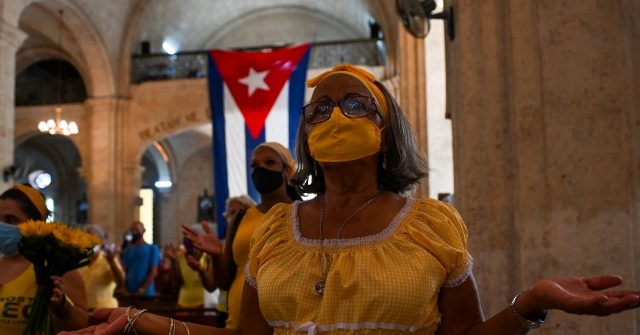A survey published Tuesday by the Cuban Observatory for Human Rights found that 60 percent of those who identify themselves as members of a religion in Cuba view such religious discussion as a “danger” in some way because of the Communist Party’s suppression of their faith. .
The same survey found that a staggering 67 percent of respondents, regardless of their personal beliefs, “may have personally encountered or met someone who has been harassed, harassed, threatened, or hindered in their daily lives for reasons linked to their beliefs.”
The Cuban Observatory for Human Rights is a non-governmental organization that monitors political repression on the island, documenting the arrests of alleged political dissidents and the Communist Party’s attacks on pro-democracy supporters.
Cuba has been under an ostensibly atheistic communist dictatorship since 1959 and has regularly persecuted believers, along with the most severely persecuted Jehovah’s Witnesses and Seventh-day Adventists in history. Recently, Catholic clergy, members of evangelical Christian denominations and followers of the widely known Nigerian Yoruba religion. santeria He is subjected to police brutality for participating in calls to overthrow the regime.
Priests on the island have called for protests and other acts of defiance, particularly against communism, in the months that led to nationwide protests on July 11, 2021, which filled nearly every municipality on the island and numbered nearly 187,000 people.
Despite decades of atheist propaganda by the government, less than half of Cubans said they practiced religion in its research into the organization, according to the Cuban Observatory. The survey found that young people (18-30 and 31-45) were more religiously inclined than older people.
“More than 60% of people with religious beliefs find it dangerous to discuss matters of faith in written forms such as blogs or Facebook and talk to non-family members about their beliefs,” the Observatory said. or meetings with other religious people.
41 percent of the general population believe that during the crackdown on the protests in July, the regime specifically targeted religious leaders because of their religious beliefs rather than their political views.
“Most people believe there are serious barriers to the use of the media by churches, religious organizations, institutions or groups to represent their faith,” the organization further said. In this sense, the most general view is among religious people, of whom 56% say it is difficult to use, for example, “radio, television, internet”. 36% of respondents believe “most” of them are inhibitory.
The protests in July sparked a national wave of violent repression, which included the tumbles and beatings of people alleged to have attended the event in their homes. Most of those who were driven from their homes and imprisoned were children who later went through extensive trials with the elders. In March, the Castro regime sentenced three children “two to ten years at the age of 16 and one with 19 years at the age of 17” for alleged links to the protests. popular unrest” and “uprising”.
On Wednesday, the NGO Defending Cuban Prisoners confirmed that it has confirmed 1,236 cases of political prisoners in Cuba, warning that the true number is higher and that the confirmed cases are the only ones the regime has allowed to be verified in another country.
After the July protests and violent crackdowns on spiritual leaders in the days that followed, nuns and priests staged the largest nationwide protest against the regime since the summer of November.
Among the leaders still imprisoned after the repression in July 2021 is Loreto Hernandez Garcia, senior leader of the Free Yoruba Association of Cuba, who was hospitalized last month after suffering a heart attack in prison. His family repeatedly demanded that the Cuban regime release him or at least give him appropriate medical care, but the government did not respond.
Open Doors, the world charity that monitors the persecution of Christians, ranked Cuba 27th on its list of the countries most difficult to identify as openly Christian on its 2022 World Watch List. Cuba ranked 61st in 2020 and 51st in 2021, and believes the group has rapidly growing state persecution of “churches considered enemies of the regime, particularly informal Protestant churches.”
“COVID-19 [Chinese coronavirus] “The crisis has been used as a pretext for thwarting church and community activities, spying on church leaders, arbitrary arrests, confiscation of private property, and extortion.” “Christian leaders of various denominations were among those arrested during the anti-government demonstrations in July.”
“The government reacts harshly to the voices of the opposition and demonstrators, so when church leaders or Christian activists criticize the regime, they face arrest, closure of their churches or businesses, imprisonment and imprisonment. They face persecution by the government and its supporters.” indicates the result.
Source: Breitbart
